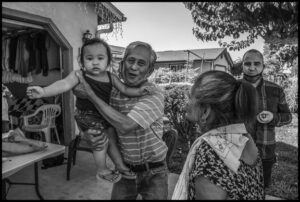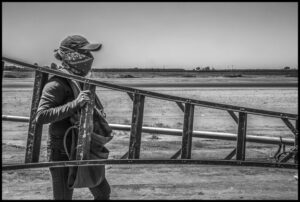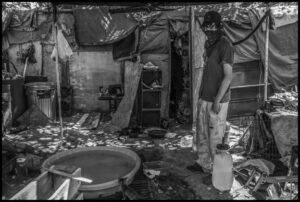By David Bacon
The Nation, January 12, 2021

© 2020, David Bacon
In California’s agricultural heartland, farmworkers are fighting back against expensive rents, substandard housing, and economic disenfranchisement.
Support for this reporting came from the Economic Hardship Reporting Project.
Poplar, Calif.-In the Covid era, poverty in California’s rural agricultural counties has become deadly. California now has over 2.7 million coronavirus cases. While Los Angeles, with its huge population, has the largest number of cases with over 920,000, the highest infection rates actually are to be found in less-populous counties with large farmworker populations. Imperial County, right across the border from Mexicali, Mexico, and Kings County, just south of Fresno, both have well over 10,000 cases per every 100,000 residents. California is the richest state in the United States, so it’s easy to forget that its rural poverty and substandard farmworker housing have contributed to the surge in Covid-19 cases here.
Tulare County, a large county in California’s southern San Joaquin Valley, was a tourist destination in better times-it’s home to the towering forests of the Sequoia National Park. But Tulare is also a working county-it was here that the United Farm Workers was born out of the 1965 grape strike, and it remains one of the most important agricultural regions in the state and the country. Tulare, with a population of about 466,000, has 34,479 Covid-19 cases, and 406 people have died. That gives it infection and death rates more than twice those of urban San Francisco or Silicon Valley’s Santa Clara County.

© 2020 David Bacon
Covid rates follow income. Family annual income in San Francisco and Santa Clara is more than twice that of Tulare. Over 32,000 the county’s residents are farmworkers, and farmworker families survive on less than half of what most US families earn.
In Tulare, poverty forces people to live closer together to share rent and living costs, making social distancing difficult. People here go to work because they have no cushion of savings-a day without pay can be difficult; a week could be ruinous. Traveling to and from the fields in crowded cars or buses also places workers in close proximity. “Getting better housing has become a survival need at a time when existing conditions make the threat of the virus much much worse,” Mari Perez, an organizer with the Larry Itliong Resource Center in Poplar, a farmworker community in Tulare County, told me.

©: 2020 David Bacon
For the full story, Click Here…
